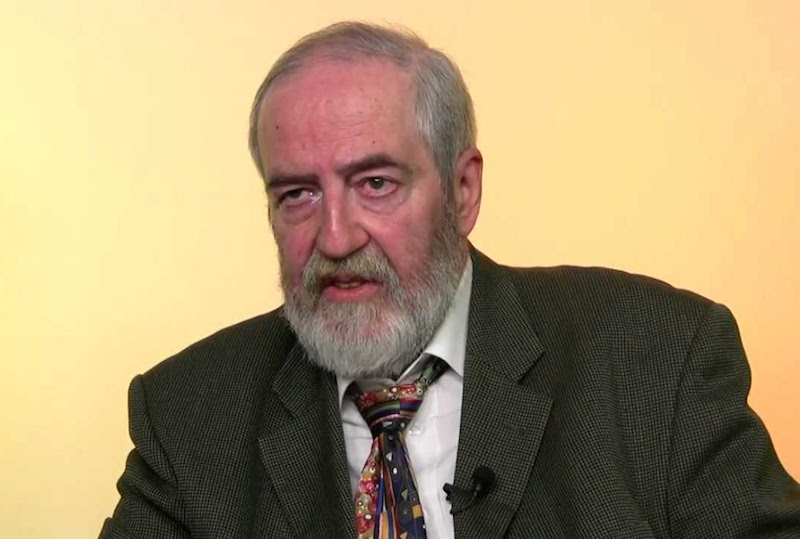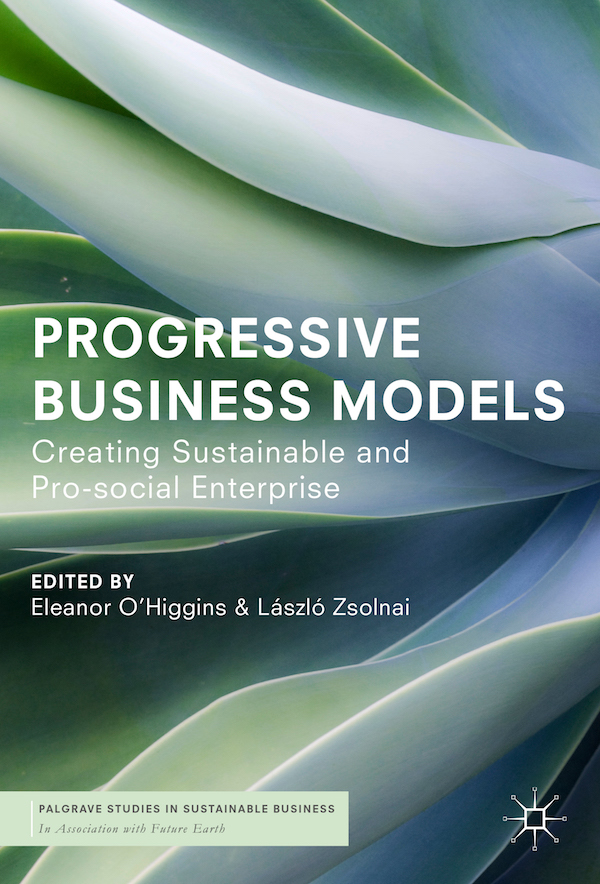Can big business become sustainable?
László Zsolnai doesn’t mince words when talking about the impacts of big business on the planet. Zsolnai is a professor of business ethics at the Corvinus University of Budapest in Hungary and co-chair of the Future Earth Finance and Economics Knowledge-Action Network. He writes in an introduction to the new book Progressive Business Models: Creating Sustainable and Prosocial Enterprise that modern businesses “are rootless in ecological and social senses, displaying no real interest in the places they happen to function.”
Progressive Business Models, which Zsolnai edited with Eleanor O’Higgins of University College Dublin, is the first in a series of books that the publishing company Palgrave-Macmillan is releasing in partnership with Future Earth. It explores cases of how businesses, from medium-sized companies to gigantic multinationals, have tried to buck those “rootless” business models – adopting strategies for fostering renewable energy, employing people with disabilities and more. Chapters delve into the progress made, and obstacles facing, companies like the Dutch bank Triodos and Unilever, a consumer goods corporation that ranks 150 on the Fortune Global 500 list.
Zsolnai recently talked to Future Earth about his book and the careful balance that “progressive” businesses must walk between making money and safeguarding the future of the planet and people.
Future Earth collaborates with a wide range of societal partners, including leaders in the private sector, to design new pathways for making the world more sustainable. To learn more about Future Earth’s work in sustainable business, check out the Finance and Economics Knowledge-Action Network.
Daniel Strain: In the introduction to your book, you write that the core problem of unsustainable businesses “can be seen to lie in the corporation itself.” What do you mean by that?

Laszlo Zsolnai directs the Business Ethics Center at the Corvinus University of Budapest. Photo: Laszlo Zsolnai
László Zsolnai: I agree with a lot of critics of corporate functioning that talk about shareholder primacy, which is sometimes called the shareholder myth – the idea that corporations exclusively focus on the interests of shareholders at the expense of others, including the planet.
It’s certainly a major issue, but we think that the problem is even bigger and deeper. We should look at the underlying business models of both corporate and unincorporated businesses. In its present form, mainstream business does not fit in the biosphere. The basic assumption of mainstream business models today is that companies can go on forever and can be as big as the universe. There are no built-in limits on growth.
DS: And some companies have grown very large.
LS: Today’s multinational corporations are bigger sometimes than countries. Toyota is bigger than Austria. It’s not a toy. These are giants on the Earth, and they are functioning without much consideration for the planet, and this creates enormous environmental and social damage.
DS: A lot of critics talk about “short-termism,” arguing that many companies are only concerned with what happens in the near future, not decades from now.
LZ: Certainly, that’s part of the problem – what we call “discounting” the future. But companies also discount impacts far away from home. European companies, for example, are often not interested in what’s happening in Indonesia or in Latin America.
DS: In your book, you’re skeptical of the ways that businesses have tried to address these issues on their own, such as through Corporate Social Responsibility (CSR). What are your concerns with those strategies?
LZ: I’ve been a business ethics prof for more than 25 years and have followed closely how this CSR movement has evolved in the West. After two or three decades, we should conclude that CSR, corporate greening and these kinds of initiatives are not just ineffective, but sometimes counterproductive.
They are basically reputation management, window dressing. CSR doesn’t solve the underlying problems of mainstream business models, and instead tries to create an impression, for example, that oil companies care for the environment.

Photo: Palgrave-Macmillan
DS: The book proposes that the solution lies in what you call progressive business models. What makes a business progressive?
Progressive businesses use new, innovative business models, which allow companies to function in a truly ecological, prosocial and future-respecting way. This sometimes creates a conflict between generating a commitment to these core values on the one hand and maintaining economic and financial viability on the other.
Our book, I think, shows that is possible to resolve this conflict, but it requires new models, and it also requires what I would call the art – not the science, but the art and wisdom – of management.
DS: Can you give an example of a company that does a good job of maintaining that balance?
LZ: Triodos is a Dutch company and has been a pioneer of social and ethical banking. They screen, simultaneously, every investment opportunity according to the criteria of ecology, social usefulness and financial returns. If a project fails to satisfy any of these three criteria, they reject it.
DS: Has that been difficult to do?
LZ: People have been eager to put their money into Triodos, but there is a limit for Triodos to accept new money because they need to find enough promising opportunities to invest using their triple criteria.
For this reason, they cannot grow fast. But they also do not want to grow at any price because they want to follow a development path that is truly consistent with their core foundational values. So all in all, they want to become a better organisation, but not necessarily a bigger one.
DS: Your book also goes into detail about the case of Unilever, which owns name brands like Dove, Lipton and even the ice cream company Ben & Jerry’s.
LZ: Unilever is one of the biggest multinationals in the world, a real giant in the consumer goods market. Recently, with CEO Paul Polman, they started a really fantastic ecological transition. Polman publicly announced years ago that he breaks with this short-termism.
Their explicit commitment is that they want to improve the quality of life for their 2 billion customers by reducing the overall environmental impact of their operations by 50%. This is something truly heroic.
DS: Why do you think this is such an important example to highlight?
The case of Unilever is an ongoing experiment to show if it is possible to transform, ecologically and socially, a really giant global corporation. We will see if it will be successful, or partly successful or not successful at all.
For me, this is something that in physics is called an “experimentum crucis” – a crucial experiment. It’s an experiment that can decide the truth or the falsehood of a theory.
DS: Unilever, however, has run into some trouble achieving that goal – the company recently extended its deadline for cutting its environmental impact by half from 2020 to 2030. What obstacles does Unilever face?
LZ: Unilever says, rightly, that without changing the mindset of the customers, they cannot succeed. The transformation of a corporation like Unilever should be part of a much broader cultural change. I think that's a very important message.
DS: So what can consumers do to support businesses trying to make these transformations?
LZ: The most important thing is that consumers should refocus their attention on what quality means for them. As an example, 15 years ago, my wife and I decided that we would eat no meat at all, zero. We redefined what quality food means for us: organic, vegetarian, local and fair trade.
DS: But is that the sort of choice that’s only possible for some consumers?
LZ: A lot of people say, OK, but we cannot afford to buy that kind of quality product because it’s more expensive. But that is a traditional economic logic. You can reorganise your life according to your values.
You can give up using cars, for example. In cities in Europe and even in North America, that’s possible. Living without a car is an organising principle, so if you decide to do that, you organise your life in a different way. For example, you can try to buy or rent your house closer to your work place and use public transportation. I walk to my university.
This isn’t static economics, but a more dynamic one. The point is that businesses should work with customers, investors and other stakeholders to make this change together. Succeeding together – there is no other way.
DS: How do you think these experiments that are underway are going to turn out?
LZ: We don't know if mainstream businesses, especially big corporations, can be reformed. Nobody knows.
But if they can’t, that doesn’t mean that there is no hope. The hope is that new business models can make the old, destructive and dangerous mainstream models extinct. Hopefully, in 20 to 25 years, there will be no global oil companies as we know them. There will be other kinds of energy companies. They will probably be smaller, more decentralised, community-oriented and use sustainable energy sources.
The hope is that if you cannot reform mainstream businesses, they will become obsolete.
DATE
October 27, 2017AUTHOR
Daniel StrainLaszlo Zsolnai
SHARE WITH YOUR NETWORK
RELATED POSTS
Spotlight on LMICs – Tired of Breathing in Pollutants? Time for Better Fuel Economy and Vehicle Standards
Future Earth Taipei Holds 2024 Annual Symposium
Spotlight on LMICs – The Future’s Juggernaut: Positioning Research as Anchors for Environmental Health